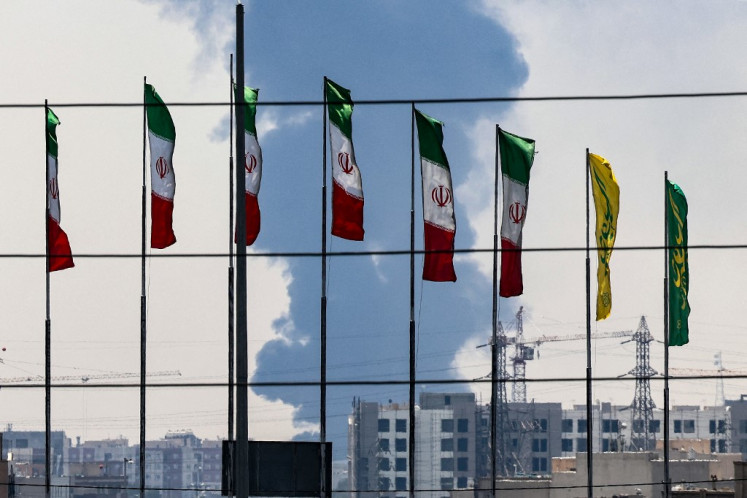Popular Reads
Top Results
Can't find what you're looking for?
View all search resultsPopular Reads
Top Results
Can't find what you're looking for?
View all search resultsMarket-based capital regulation necessary
The Greek crisis has again spawned concerns worldwide, although the EU bailout proposal to implement austerity measures was finally accepted by Greece
Change text size
Gift Premium Articles
to Anyone

T
he Greek crisis has again spawned concerns worldwide, although the EU bailout proposal to implement austerity measures was finally accepted by Greece.
Nevertheless, Greece still needs to struggle with tough reforms to cut government spending; not to mention that as part of the EU, Greece cannot use monetary policies independently to offset adverse implications due to limited room for government spending.
With all these developments, the prospect of the EU's economic recovery remains uncertain.
Hence, the US economy will also remain gloomy.
This may provide breathing room for Indonesia at least in the short term, to reinforce its domestic resilience, before the effect of the eurozone crisis can spill over considerably through China's hard landing.
For Indonesia itself, elevated risks of economic downturn have already been seen due to the end of the commodity prices boom.
The World Bank just revised the 2015 gross domestic product (GDP) growth of Indonesia from 5.2 percent to 4.7 percent, which is mostly driven by weakening demand-side factors.
It can be seen that although the rupiah already depreciated, goods exports still deteriorated by 13.9 percent year-on-year in the first quarter (Q1) 2015.
Also, the ratio of non-performing loans to total loans that increased from 2.2 percent (December 2014) to 2.5 percent (April 2015), while credit growth declined from 22 percent year-on-year (April 2013) to 10 percent year-on-year (April 2015), despite strong funding structures in banking.
In response to these situations, the Financial Services Authority (OJK) revised the definition of the loan-to-deposit ratio to become the loan-to-funding ratio (LFR), while Bank Indonesia (BI) also revised its macro prudential tool in accordance with this modification (i.e. reserve requirements based on LFR, or the so-called GWM-LFR). This allows greater flexibility in which bank funding sources not only come from deposits and short-term funding, but also from debts and marketable securities.
In parallel, BI also increased the loan-to-value (LTV) ratios for mortgages, as well as car and motorcycle loans, in order to invigorate household consumption spending that is currently missing in Indonesia's economy.
The interplay of these regulations is indeed crucial to spur consumption, which in turn helps economic recovery through the demand side.
However, there remains scope for further consideration on the side of financial sector policies, especially when elevated risks are more persistent, which aggravate non-performing loans and deplete capitalization in the banking industry. So-called 'capital crunch' problems will occur, preventing banks from boosting lending when a sharp decline in bank capital occurs. This will further precipitate economic recession.
Accordingly, several counter-cyclical measures (e.g. LTV, GWM-LFR and counter-cyclical capital buffer) will no longer be sufficient if the economy continues to worsen and bank capital deteriorates. In this situation, raising capital is necessary, but is also very costly.
Hence, developing new flexible hybrid instruments that can be converted into capital with lower cost in times of crisis is worth considering.
Equity recourse note (ERN) could be a possible option. ERN is simply a debt instrument in stable periods, but this can be converted by a bank into equity during crisis periods, particularly when a bank's stock-price decline exceeds a certain threshold.
In other words, a bank can repay such debt by issuing more shares rather than by using cash. As such, the triggers of such conversion are determined by market situations rather than government intervention. If this instrument works properly, bank capital can be maintained in times of crisis and lending activities remain substantial to help economic recovery.
Using ERNs, banks can also be safer without more stringent rules from regulators, because banks will be made more prudent by greater market discipline.
But this also means that financial regulators will have more work to ensure that the market for ERNs works properly and to monitor market players involved in ERN transactions, so that market discipline mechanisms work effectively.
Despite all the additional work, the efforts of regulators will pay off, as ERNs will enable banks to maintain capital adequacy ratios without necessarily requiring a government bailout with possible drawbacks.
However, the role of government bailouts indeed remains important in some crucial situations.
Ultimately, before all these arrangements can be made, the finalization of a financial safety net law by the House of Representatives is essential to reinforce market confidence in the Indonesian financial system.
___________________________
[...] the triggers of such conversion are determined by market situations rather than government intervention.
_________________________
The writer is a senior lecturer at the School of Business, Sampoerna University. He holds a PhD in money, finance and banking from the Universite de Limoges, France. The views expressed are his own.









